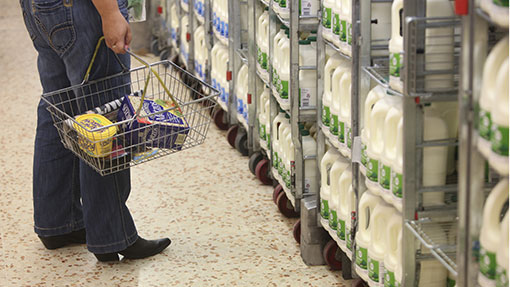Fears at farmgate as supermarkets start price war

A supermarket price war on milk has sparked fears that farmgate prices will be hit to protect retailer profits.
Tesco slashed the cost of four pints of milk from £1.39 to £1 on Monday 3 March. Two days later Sainsbury’s matched the move and The Co-operative cut the price of one and two pint bottles to 45p and 85p respectively.
More than 70% of the grocery market now charges £1 for four pints, as Asda, Aldi and Lidl have done so for several months.
Tesco, Sainsbury’s and The Co-op all said the discounts would not affect how much the farmers who supply them are paid.
But farm leaders have warned that if supermarkets wanted to have price wars then the cost would have to come out of retail margins.
NFU chief dairy adviser Rob Newbery said: “Creating this impression or illusion that food is cheap is damaging on the agricultural industry and how the public view food.
“We do not want to price of food to be the ground on which the retailers go to war on each other.
“Farmers do not set retail prices but we will be monitoring the situation to ensure this short-term marketing effort does not have an impact on farmgate milk prices now and further down the line.”
See also: Muller Wiseman cuts formula price
But the retailers have played down the potential impact of in-store price cuts. Tesco took out full-page adverts in national newspapers to say the price the 650 members of its Tesco Sustainable Dairy Group are paid will not be affected.
Sainsbury’s said its “point of difference” was that it offered value both to customers and in the supply chain.
And The Co-op said it would not be asking its milk producer group to contribute to the reduction in its efforts to be “the UK’s leading community retailer”.
Both the Tesco suppliers and the 300 members of the Sainsbury’s Dairy Development Group are paid on a cost-of-production basis calculated using independent consultants.
“What’s important is that these price wars do not undermine the value of the products which farmers and growers work tirelessly to produce and meet world class standards.”
Meurig Raymond
NFU president
Kantar Worldpanel communications director Edward Garner said milk was “handy” for supermarkets looking for headline-grabbing price cuts without too much cost.
“I do not think people have concern on its provenance,” he said. “Milk is one of those things that people think, ‘milk is milk,’ unless it is organic.”
But NFU president Meurig Raymond said the effect of the price cuts risked undervaluing the hard work of British farmers.
“What’s important is that these price wars do not undermine the value of the products which farmers and growers work tirelessly to produce and meet world class standards.
“What we want to see is decisions on pricing that ensures the longer term sustainability of food production – enabling continual growth and investment in the raw material production so that we are able to grow, innovate and provide choice to meet future consumer demand.”
